Memorial Advancements
TECHNOLOGY
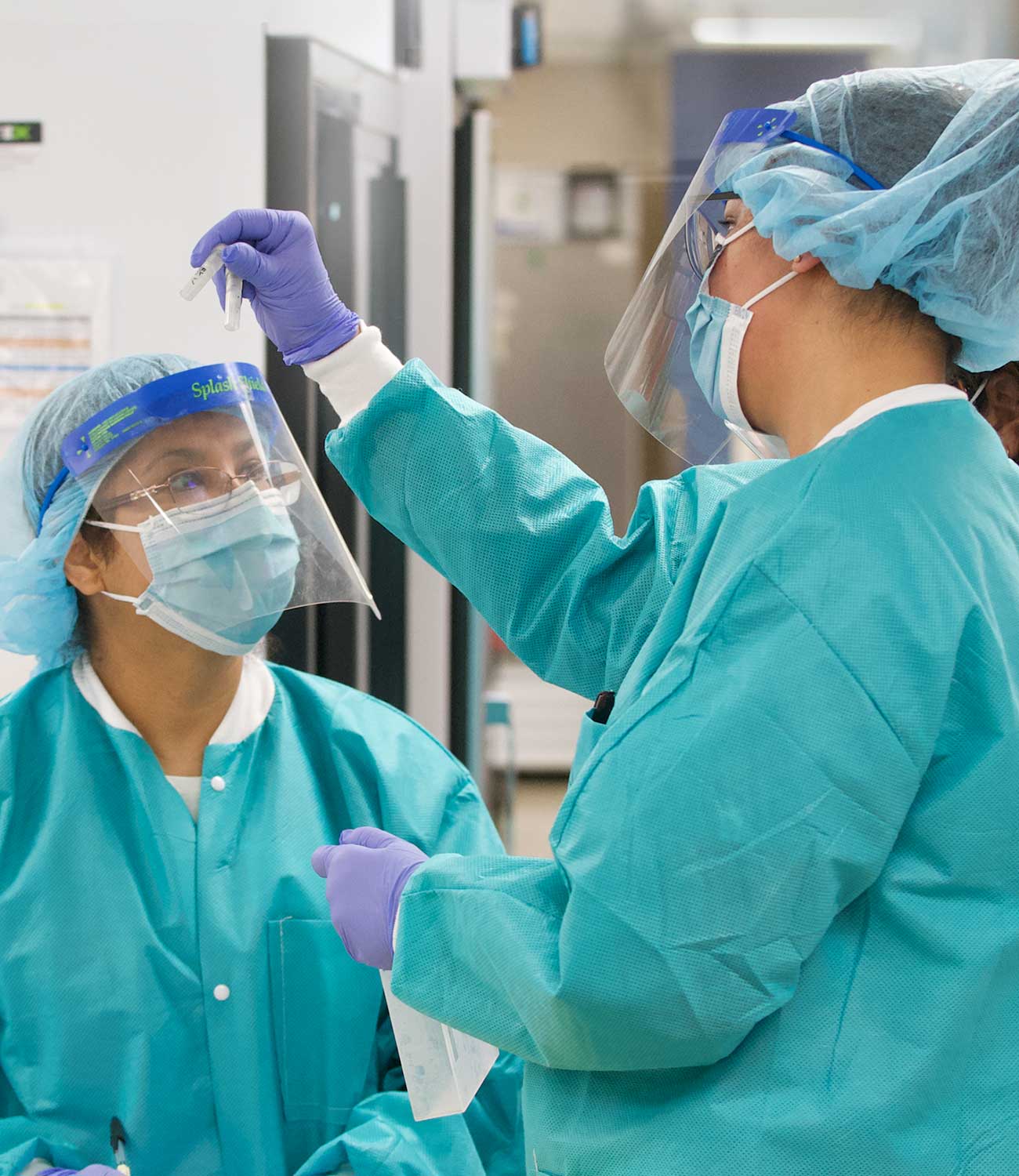
The molecular lab at Memorial Regional Hospital South became the first in the area to offer SARS-CoV-2 testing.
Adapting to the Pandemic
Innovation and quick pivots by Memorial staff accelerated new services and re-imagined some of the old.
An example of this ingenuity was employing the molecular lab at Memorial Regional Hospital South to perform COVID-19 testing. The lab already was outfitted to perform the polymerase chain reaction test for COVID-19. With a few modifications and effective planning, the facility not only met the System's growing need for fast, accurate lab work, but also became the first in the area to offer SARSCoV- 2 testing.

In addition to more telehealth video visits with physicians, Memorial gave patients iPads to communicate with the nurse's station.
“We were able to ramp up in a month. Some of the instrumentation was already here, and we were able to add instruments,” said Julie Poveda, Director of Laboratory Services at Memorial Regional Hospital South. “As soon as the CDC approved the method, we had already ordered the kits. Our medical director and clinical scientists already had an action plan in place.
The molecular lab at Memorial Regional Hospital South increased from 30 tests a day pre-pandemic to 1,500 a day doing COVID-19 testing. That’s a 4,900% increase!
From MyChart telehealth visits to iPads at the bedside of COVID-19 patients, technology has been an invaluable tool for connecting patients and Memorial providers and for keeping services and programs active during COVID-19.
Using hardware and software advances in creative ways has increased communication and participation across disciplines and enhanced patient care beyond expectations.
TELEHEALTH PATIENT VOLUME

RESEARCH
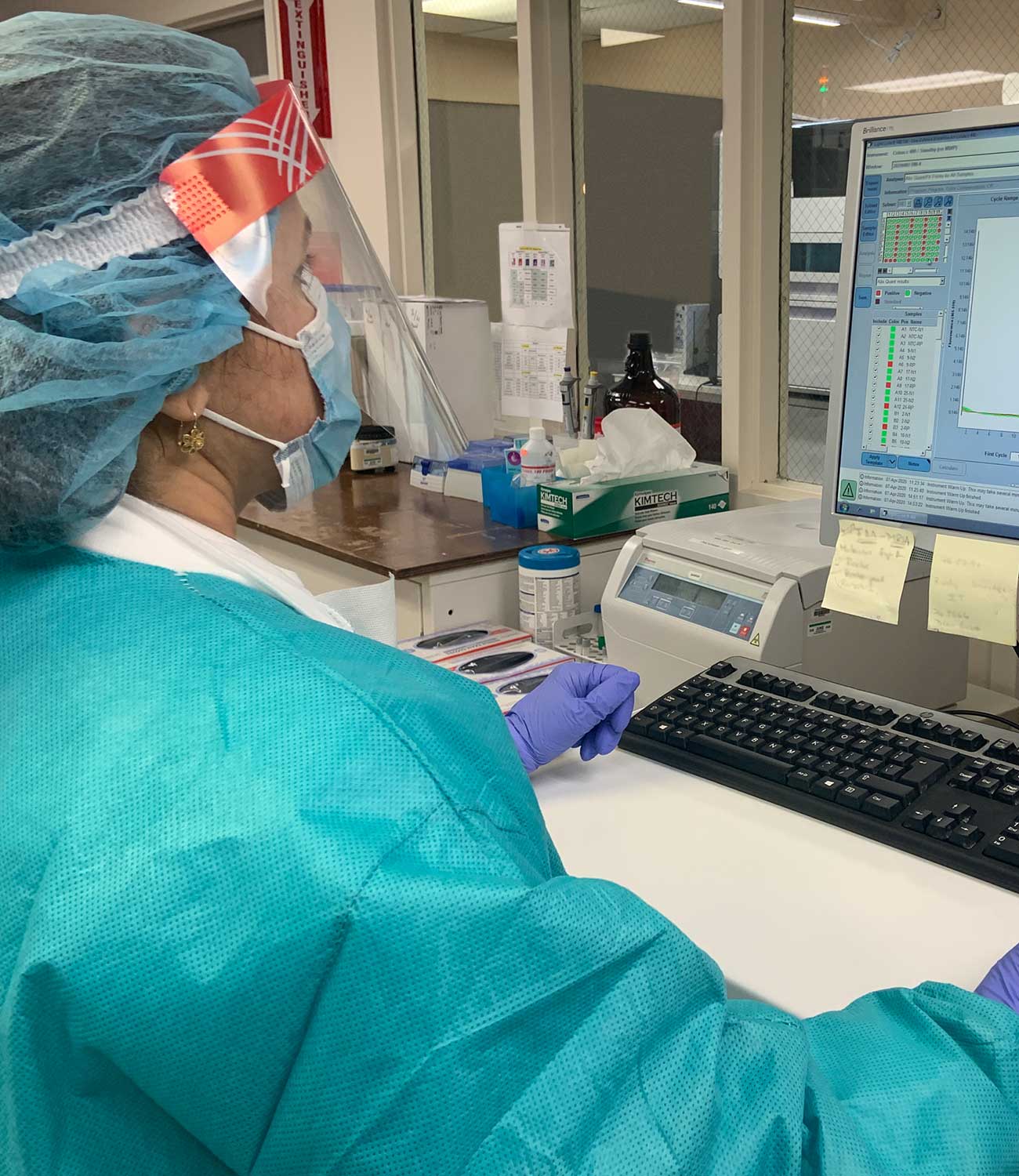
Memorial staged two critical COVID-19-related clinical trials last year.
Clinical Trials Provide Patients with Access to New Therapies
Memorial Healthcare System’s Office of Human Research continues to provide hope to our community by providing access to cutting-edge drug and technology therapies.
Despite the pandemic, Memorial supported more than 150 open to accrual studies, enrolled 1,725 patients onto trials and staged two critical COVID-related clinical trials over the course of 2020.
A trial in partnership with the Mayo Clinic studied the effects of convalescent plasma on COVID-19 patients. Memorial was one of the highest enrolling sites in the United States, enrolling 1,175 patients who were transfused with convalescent plasma during the summer surge. This required a system-wide collaboration of front-line ICU, infectious disease and internal medicine physicians and nurses, researchers, lab staff and Memorial’s plasma partner, OneBlood.
“Every front-line staff member was involved, including our residents, Memorial’s lab and our research team. It was a true example of the teamwork and systemness that we strive for,” said Candice Sareli, MD, Vice President and Chief Medical Research Officer.
Studies
in Trials
Monoclonal Antibodies Offered for High-Risk COVID-19 Patients
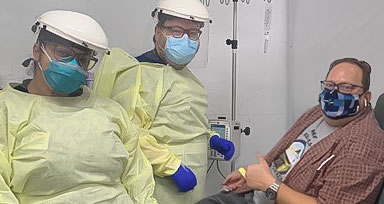
First patient receives monoclonal antibody treatment at Memorial Hospital Pembroke.
As part of Memorial Healthcare System’s response to the COVID-19 pandemic — and in an effort to stop or halt progression to severe disease — Memorial began providing monoclonal antibodies in January 2021 to qualifying COVID-19 patients.
Over 600 patients at high risk for developing severe COVID-19-related symptoms have received infusions of monoclonal antibodies. Nurses and doctors have been administering the new drugs at a temporary outpatient center located at Memorial Hospital Pembroke.
Monoclonal antibody therapy works by mimicking antibodies, or proteins, that the body naturally produces to fight viruses. The lab-made monoclonal antibodies bind to the virus’ spike protein and help block the virus’ entrance into human cells.
Previous clinical trials have shown that investigational therapies can significantly reduce progression to severe disease and, subsequently, the need for emergency room visits or hospitalization.

We were able to realize our vision of being able to offer all of our patients a research option and access to novel therapies during this critical time.”
Vice President and Chief Medical Research Officer
EDUCATION
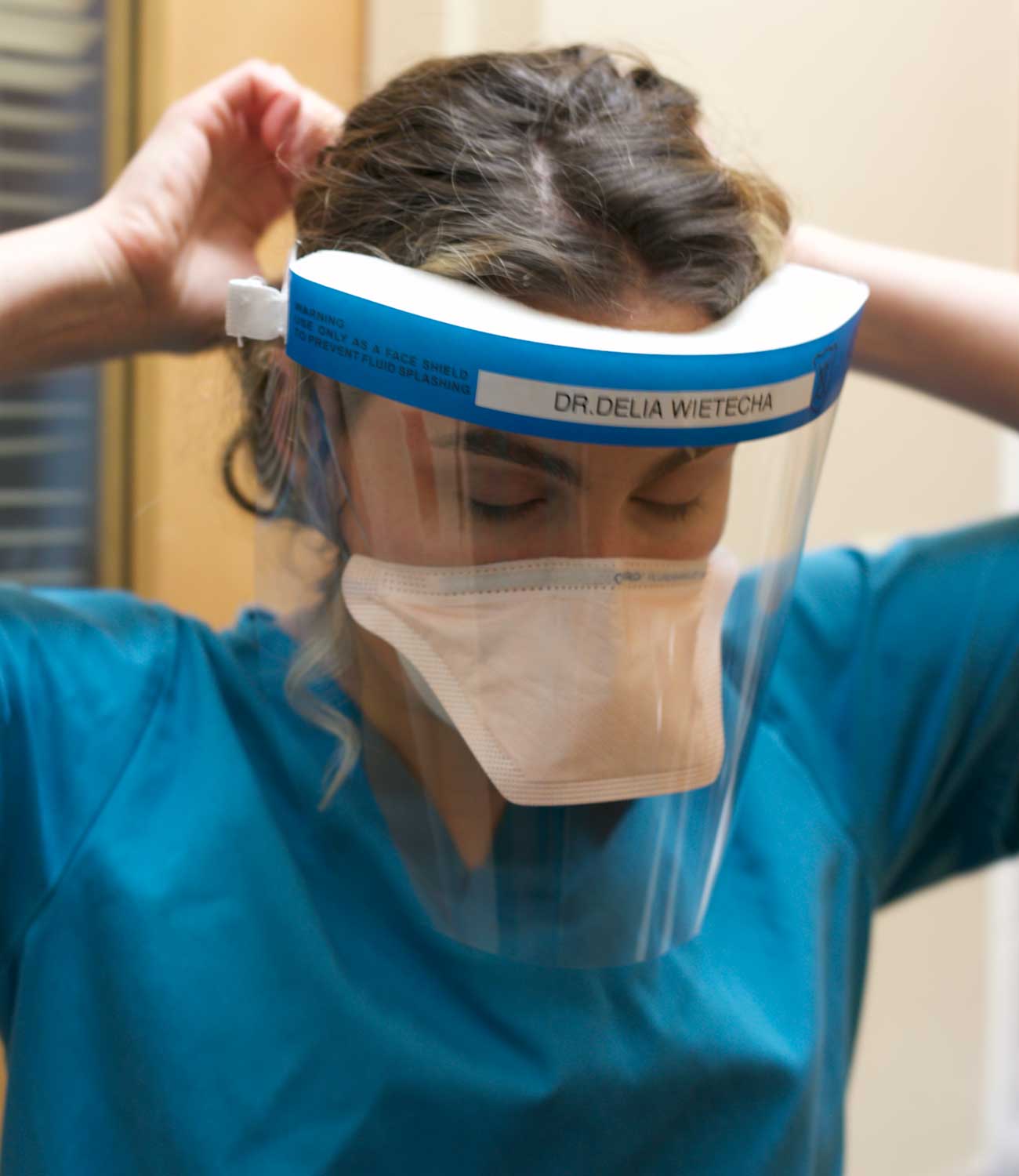
Graduate Medical Education residents served a significant role on the COVID-19 front lines.
Residents Remain on the Front Lines of COVID
Memorial’s Graduate Medical Education program continues to grow and expand into additional specialties, while residents support care on the front lines of the COVID-19 pandemic.
When the pandemic began in March 2020, Memorial had seven training programs in operation and two more set to start in June. This meant Memorial had 122 residents on hand to assist with caring for patients.
Internal Medicine residents were greatly impacted, as they were often redeployed throughout the system to where their help was most needed. This included ICU care for the most critically ill patients and the drivethrough testing site at C.B. Smith Park, where residents assisted with COVID-19 testing and phoned patients to provide test results and guidance on follow-up care.
“We responded both from a direct patient care standpoint and also with a public health response,” said Ahmed Shoreibah, MD, Program Director of the Internal Medicine Residency Program. “Both were very demanding, and it was very stressful and a lot of work. We are very proud of how our residents stepped up and responded in conjunction with the rest of the Memorial system.”
All Memorial training programs transitioned to virtual platforms, and residents began using telehealth to provide care along with the rest of the healthcare system.
It was really incumbent on us to guide them through this period while maintaining their safety, their training and making sure they were able to step up and meet the needs of the community.”
Program Director, Internal Medicine Residency Program
RESIDENTS CARED FOR:
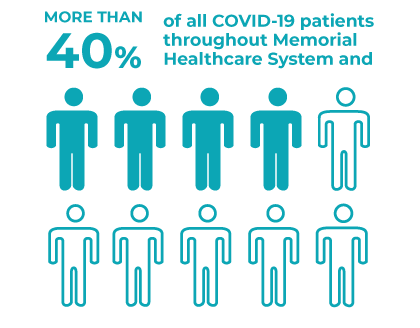
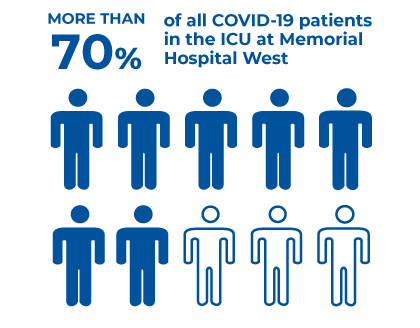
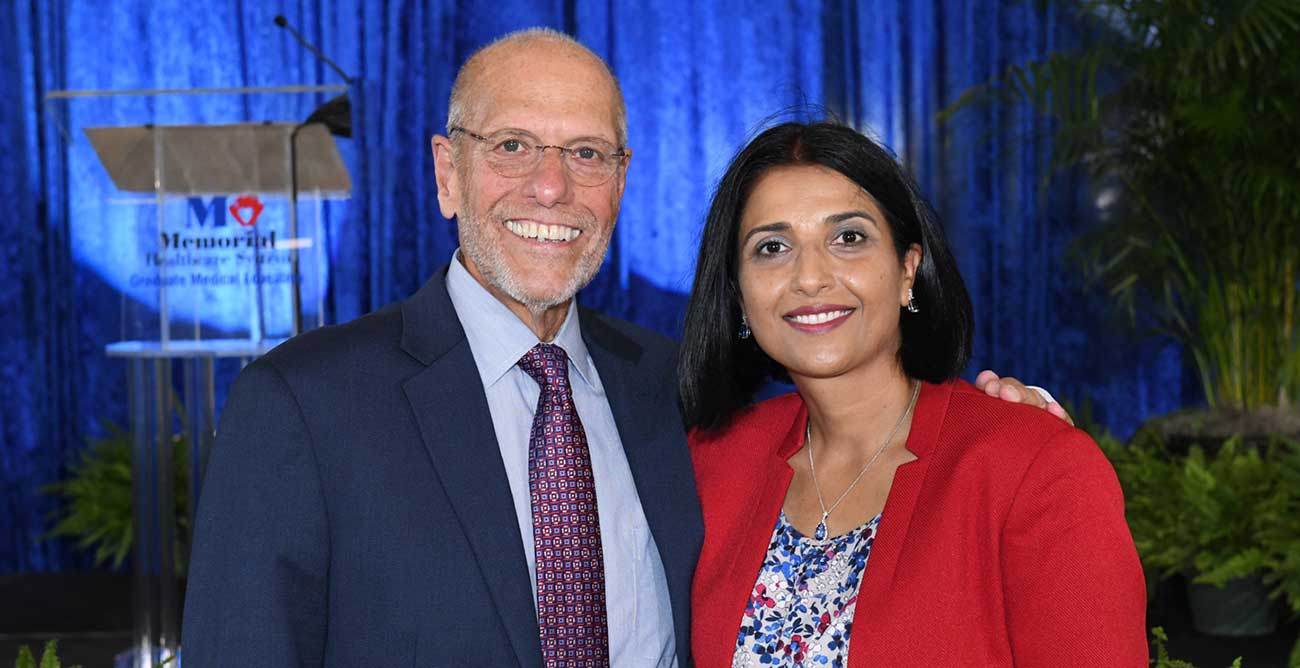
Stanley Marks, MD, FACS, retired, with Saima Chaudhry, MD, MSHS, FACP, Chief Academic Officer
Naming Honors Former Executive
In 2020, the GME White Coat Ceremony was named in honor of Stanley Marks, MD, FACS, who retired in October 2020 after 42 years with Memorial Healthcare System.
Dr. Marks, who was Senior Vice President and Chief Medical Officer at the time of his retirement, began his Memorial career in 1978 as a general and vascular surgeon. Over the following four decades, he built a legacy of leadership as both a physician and an executive.
He created the Graduate Medical Education program and Memorial’s Office of Human Research, spearheaded the development of unified bylaws and a centralized credentialing system for medical staff and served as Memorial incident commander in the early days of the pandemic.
“We have been able to truly put Memorial on the map in terms of education and training,” Dr. Marks said.
Helping Nurses Expand their Horizons
Memorial Healthcare System continues to expand its nurse education programs to help new graduates launch their careers and help experienced nurses get additional training in specialized areas.
The programs also create a pipeline of experienced and passionate professionals at a time when the national nursing shortage has been further exacerbated by the effects of a global pandemic.
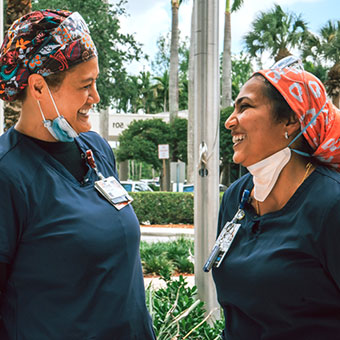
Memorial continues to grow its educational opportunities for nurses with residency and fellowship programs.
“From the inception of Memorial’s Nurse Residency Program in late 2018, we have helped launch the careers of more than 1,000 nurse graduates. This has been more of an advantage than we’d originally anticipated as more experienced Baby Boomer nurses are exiting the workforce, accelerated by the pandemic,” said Maggie Hansen, MHSc, RN, Senior Vice President and Chief Nurse Executive at Memorial.
“And the group’s propensity for innovation has proven valuable in overcoming additional patient care challenges posed by the pandemic,” Hansen added.
Nurse Residency Program
Memorial’s Nurse Residency Program was created to support nurse graduates transitioning from the classroom to professional practice. In July 2021, Memorial welcomed its ninth cohort of nurses. Each cohort has approximately 100+ nurses.
“The residency program helps novice nurses build on what they learn at the bedside by developing their clinical reasoning skills, as well as provide opportunities to connect and learn from one another,” said Anthony G. Gonzalez, MSN, RN, CCRN-K, Director of the Nurse Residency Program.
While the COVID-19 pandemic forced the program to pivot and transition to a virtual teaching environment, Gonzalez said online platforms offered new ways for nurses to participate, connect with and support their peers.
“Our goal is to give them the knowledge and training to become leaders at the bedside, while providing a strong support system that can endure well beyond their time in the program,” Gonzalez said.
Nurse Fellowship Program
Memorial’s Nurse Fellowship Program offers nurses with at least one year of experience the opportunity to transition to new nursing specialty practice areas. This helps nurses learn the skills needed for more complex nursing care, while also filling needs in Memorial’s specialty areas.
“We hire them into these specialties and give them a really robust training and group support to help them grow in their new practice area,” said Valarie Grumme, PhD, RN, CCRN-K, Director of the Nurse Fellowship Program.
So far, the program has focused on critical care, emergency and oncology nursing and is expanding to surgical services, cardiovascular services, interventional radiology, and labor and delivery services.
“The sky’s the limit,” Grumme said. “It’s a great opportunity for nurses to learn and grow, and for the healthcare system to meet its workforce needs.”
Nurse Residency Program
Launched 2018
Nurse Fellowship Program
Launched 2021
PARTNERSHIPS

Improving Health Through Value-Based Care
Memorial Healthcare System has continued to advance its transformation to a value-based care model over a fee-for-service platform.
“The year 2020 was a very busy year for us in valuebased care, improving health outcomes across well over 100,000 lives that we covered and helping our physicians transform and build muscle in moving toward value-based care,” said Matthew Muhart, Executive Vice President and Chief Strategy Officer.
In May 2020, Memorial acquired 100% of Broward Guardian, a Medicare Shared Savings Program ACO, or Accountable Care Organization. Memorial leadership sees this acquisition as a positive and important step to expand its current portfolio of value-based care arrangements.
In particular, this acquisition enabled Memorial to extend to Broward Guardian its substantial and high-performing value-based care infrastructure, which supports its commercial ACO, Memorial Health Network, and the several bundle payment programs it participates in. This enhanced the care and efficiency outcomes for Medicare beneficiaries in Broward Guardian.
Medicare ACOs consist of doctors, hospitals and other healthcare providers that have joined forces to improve the overall care delivery to Medicare patients. According to the Centers for Medicare and Medicaid Services, “coordinated care helps ensure that patients, especially the chronically ill, get the right care at the right time, with the goal of avoiding unnecessary duplication of services and preventing medical errors.”
Redefining the Care Model
Building on Memorial Health Network and the bundle payment program aligns with Memorial’s outlook for healthcare’s inevitable transformation.
The old paradigm begins with an isolated patient visit, followed by days, if not weeks, before a follow-up appointment. Safeguards aren’t necessarily in place to intervene if a patient’s condition worsens before the next doctor’s visit.
Under the new model, the patient’s health is monitored over time to catch problems before they become critical. The long-term benefits are lower healthcare costs, higher quality of care and improved quality of life, especially for patients with chronic illnesses.
Memorial also expanded participation in Medicare’s Bundled Payments for Care Improvement programs, moving from five to 19 bundles.
This bundled payment program sets a spend target for all services rendered to a patient for an episode of care over a 90-day period. Memorial’s value-based care team coordinates and monitors the patient’s healthcare needs across the care continuum during that period, lowering the risk of readmission and making sure the patient receives care when and where they need it.
Lastly, Memorial entered into a collaboration with Oscar Insurance and Holy Cross Health, bringing a co-branded Medicare Advantage Plan to Broward County residents.
“We have proven, through working closely with the physicians and other care partners, that we can enhance health outcomes and efficiencies,” said Muhart. “The developments we accomplished this year provide a larger scale that sets us up very well for continued growth and success, which will positively affect the health of the community we serve.”
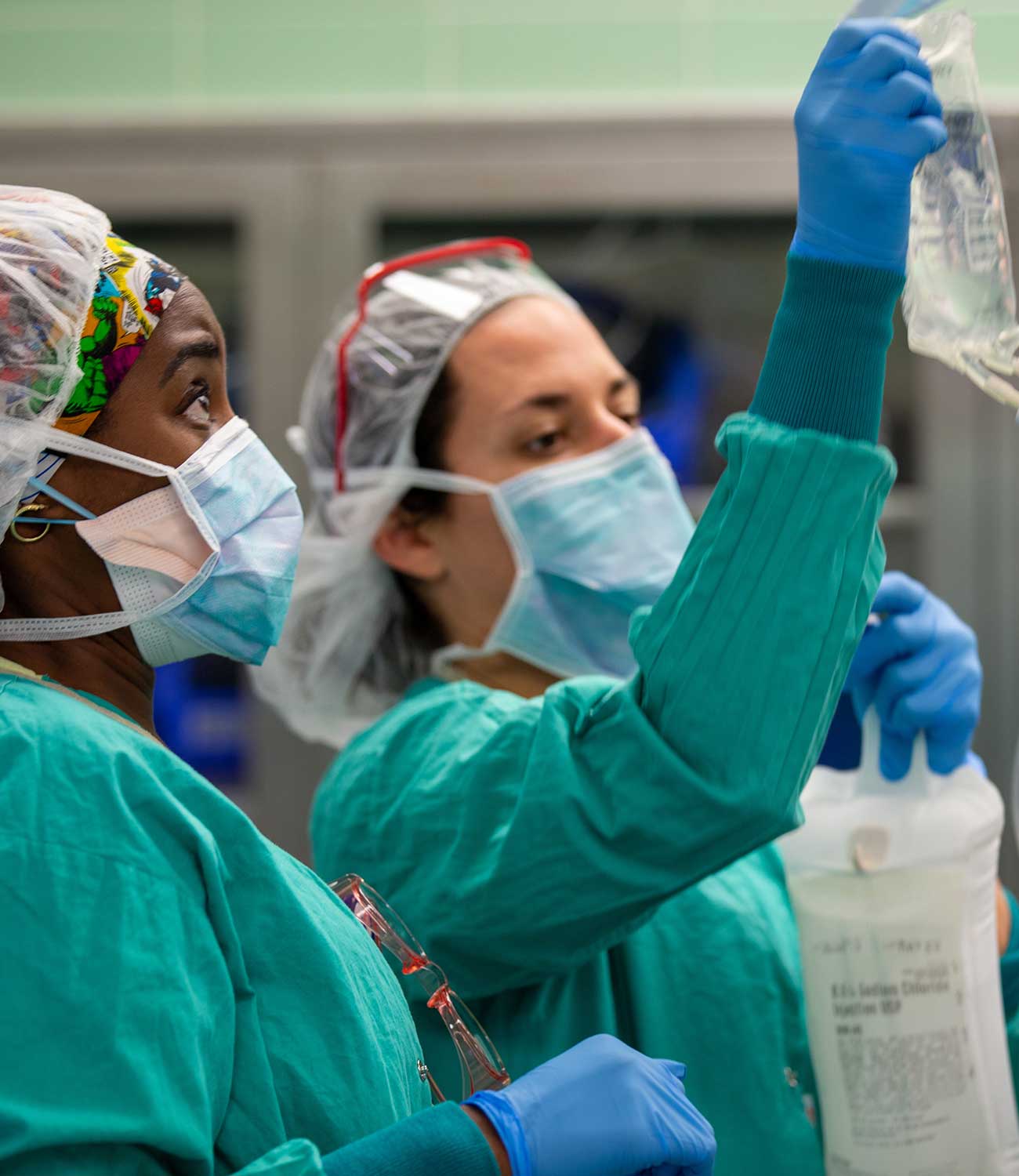
Launching a Co-Branded Medicare Advantage Plan with Oscar
Memorial Healthcare System announced a partnership with Oscar, the first tech-driven health insurance company, and Holy Cross Health, a top-rated health, teaching and research institution, to bring a comprehensive Medicare Advantage plan to Broward County residents.
The co-branded healthcare plan merges Memorial’s and Holy Cross Health’s extensive physician network with Oscar’s state-of-the-art technological resources.
“Oscar and Holy Cross share our vision of using technology to improve the medical experience for patients and families in South Florida. This Medicare Advantage plan, and our collective partnership, is providing tools and resources for patients to take a more active role in their healthcare journey — something we’ve long advocated in our approach to value-based care and population health,” said Aurelio M. Fernandez, III, Memorial President and CEO.
Enrollment for the individualized plan began in October and became active in January 2021.
Members enjoy convenient, easy access to the top doctors at both Memorial Healthcare System and Holy Cross Health. A connected care team helps members navigate the plan and maximize in-network resources. The new plan also includes 24/7 virtual urgent care, which utilizes Oscar’s technology to allow members unlimited visits with providers for diagnoses, care instructions and prescription assistance from the comfort of home.
The partnership is a game changer for Broward County’s Medicare recipients, as it maximizes the quality and delivery of patient-centered care. The plan itself marries the best practices of Memorial Healthcare System, Holy Cross Health and Oscar to meet the current healthcare needs of every member.

Memorial Helps Healthcare District of Palm Beach Make Epic Connection
Epic is one of the world’s largest integrated and clinically safe software systems for storing electronic health records (EHR). The Healthcare District of Palm Beach County didn’t have the resources or organizational scale to support direct contracting through Epic for its EHR. However, Memorial’s status as a leader in healthcare has allowed it not only to purchase Epic, but to sublet the product to other healthcare systems.
“The Healthcare District of Palm Beach approached us and asked if we would be willing to extend our Epic EHR to them. They know that we’ve really achieved pretty stellar performance, both clinically and financially, because of our electronic health record,” said Jeffrey Sturman, Senior Vice President and Chief Digital Officer.
Memorial agreed to share its Epic EHR program through Community Connect with Palm Beach under two conditions. First, Memorial would monetize the platform and make a small profit to offset costs. Second, the connection between Memorial and an external healthcare system eventually would manifest in patient sharing and providers helping each other. The value to Palm Beach is acquiring use of an otherwise inaccessible Epic EHR system that will improve healthcare in that community.
After nearly 18 months of planning, Memorial’s implementation of Epic’s Community Connect with the Healthcare District of Palm Beach County went live on July 1, 2021. This mutually beneficial collaboration and integration sets the foundation for the strategic overlap of population health activities in Broward County and beyond.
“We’re looking at this collaboration with the Healthcare District of Palm Beach as of strategic significance. We know we may not see immediate sharing of patient populations or potential efficiencies to be gained,” said Sturman. “But the vision is that, between our two organizations, we not only leverage a best in class electronic health record, but also create opportunities to share more comprehensively in operational excellence and even the delivery of care settings.”
